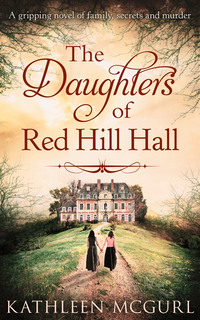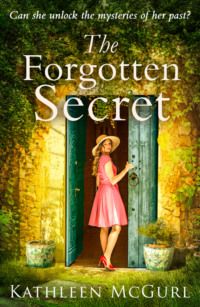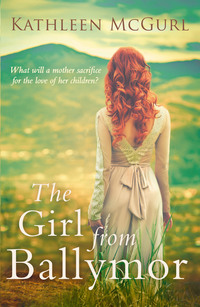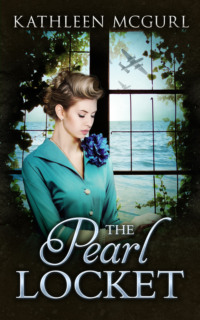
Полная версия
The Forgotten Gift
My father makes no secret of the fact that Charles is his favourite. As Charles is his first born I suppose that is to be expected. But he looks upon me as though I am vastly inferior, as though he barely counts me as his son at all. My mother is withdrawn, cold and unfeeling towards me. The loss of her daughters was more than she could really bear, I believe. Perhaps in fear of losing another child, she hardened her heart against those who were still living, though not to Charles, whom she too favoured.
Mother loves Charles. He left home last year, to set off on his Grand Tour of France and Italy. Mother wept as he left, clutching hold of him until the last possible moment. ‘You are leaving me all alone and childless,’ she’d said, and Charles had shaken his head. ‘You still have George, Mother. He will keep you company while I am away. Give him a chance – he is a fine young man.’
I’d preened a little at this compliment from Charles, and he’d smiled at me. But Mother just laughed. ‘He’s no substitute for you, dear Charles. Keep yourself safe, and return to me soon.’
‘I shall return to all of you,’ Charles had said, and then he’d bade us all farewell, his last and longest embrace being reserved for me.
An imaginary reader of this journal might think I exaggerate when I say my parents paid me no heed throughout my childhood, and indeed appeared to look upon me as one might consider a poor, distant relation. Someone to whom they had a duty to care and provide for, but for whom they held no love or affection. But I do not exaggerate. Just last week, I overheard a conversation after dinner, between my father and his friend the doctor Jonathan Moore. Let me set down here what happened and what it was that I heard. Perhaps in writing it down it might help me come to terms with it.
We had finished dinner – a small dinner party for just our family and the Moores. The ladies – my mother and Mrs Moore – had retired to the drawing room, while my father and Dr Moore lingered over the port. As a man, and almost of age, I wanted to stay too, but a stern look from my father told me I was not welcome. I pushed back my chair, nodded to Dr Moore and left the room.
In the hallway I dithered a while. The ladies wouldn’t want me with them either. I felt caught in the middle, not wanted anywhere. A metaphor for my life to date, I thought, as I lingered, trying to decide what to do with the rest of my evening. I became aware that the men were talking about me, and as the door to the dining room was not quite shut (I had failed to pull it firmly enough for it to latch) I could hear every word. It was as though I was rooted to the spot. I am not normally someone who would listen at keyholes, and indeed Mr Smythe would say it is an exceedingly low thing to do, but in my defence I would say that their voices were loud, and who would not stop to listen, on hearing their own name mentioned?
‘I don’t know what will become of George,’ my father said. ‘It is a shame we are not at war. If we were, I would buy him a commission. Fighting for his country would toughen him up. Lord knows he needs it. That tutor we employed – Smythe – was far too soft on the boy. Never thrashed him once, as far as I could tell.’
A commission! I suppressed a gasp at this. While I did not know what I wanted for my future, a commission in the army was certainly not it. I had no desire whatsoever to become a soldier.
‘Hmm. Not all boys need thrashing,’ Dr Moore answered. ‘He seems a pleasant lad, well informed and intelligent. I’d say Smythe was good for him, from what I’ve seen. You could still buy him a commission – we need an army whether or not we are at war. But is it the right thing for him?’
‘What do you mean, the right thing? Something needs to be done to make a man of him. He’s too soft and sensitive, always reading poetry and wandering about the countryside looking at flowers. Women’s pursuits.’ Father snorted, and there was a moment’s silence in which I imagined him taking a sip of his port and shaking his head sadly. It is true, though, I do love to read verse and seek out rare flowers in the hedgerows and meadows of our beautiful countryside.
‘The world needs all kinds of men, Albert old chap. Not just the tough soldier boys. There’ll be a place for him in this world. You just need to help him find it.’
‘He’ll get no help from me. The house and estate will go to Charles. There won’t be enough money to keep George for life. He’ll have to find some sort of profession I suppose. But he shows no interest in the clergy, or medicine. What else is there?’
‘Oh, there are plenty of professions beyond those, Albert. Law, or teaching, or business. Perhaps you should send him to Oxford or Cambridge. He’s bright enough.’ I raised my eyebrows at this. I had never considered a university career. I wondered whether I would enjoy life in academia. Perhaps I might. My musings were cut short by my father’s reply.
‘I can’t afford to send him to university, Jonathan. And I don’t see the point. I never went, so why should he? Yes, I suppose he will need to make his own way in business. I just don’t see how he’ll be any good at it. His head’s always too much in the clouds.’
‘What does Augusta think?’
‘Hmph. She has less time for him than I do. You know, she never got over losing the girls. If she hadn’t been heavily pregnant she might have been able to do more for Elizabeth. And George was sick with influenza just before Isobel died of that same disease. He survived it while she did not. I think poor Augusta never forgave him for that.’
‘Hardly the boy’s fault, though, was it?’ Dr Moore said. ‘There was nothing that could be done for either of your little girls, unfortunately, or for the other child. Don’t forget I tended to them all during their final days, the poor mites.’
‘I know. No one’s blaming you. I just think that Augusta blames George, illogical though that is. She wastes no love or time on him, I’m afraid.’
‘And yet you don’t try to make up for this?’
Father sighed and paused before answering. ‘I should, I suppose. But I find the boy hard to like. I will keep him until he is of age. I will pay him an allowance until he is established in some kind of profession. And then he will need to make his own way in life.’
‘Well, I suppose if you don’t like the boy, that’s as much as you can be expected to do. Parenting is a difficult task. I am glad Amelia and I never had any children. I’d have been no better at it.’
I raised my eyebrows again at this last statement from the doctor. I had never before considered that parents could be good or bad at parenting. I had always assumed I must be unlovable, and that is why my parents didn’t love me. Could the fault actually lie with them?
At that moment the drawing room door opened, and my mother came out, calling behind her to Amelia Moore that she was just fetching her latest bonnet to show her. She pulled up short on seeing me lurking in the hallway.
‘What are you doing here? I thought you were drinking port with the men?’
‘They didn’t want me. I was on my way upstairs to my room.’ I stepped on to the first step as though to prove myself.
‘Oh. Good.’ She pushed past me and climbed the stairs quickly, no doubt wanting to get back to the drawing room as fast as she could.
I followed her up, and spent the rest of the evening in my room, reading the poetry that my father sneered at.
That evening, as I said, occurred about a week ago. I have replayed what Father said many times, praying that he does not buy me a commission, for I know I would loathe being in the army. I know I will need to think of some kind of profession and find a way to build myself a career, but for the moment I have no idea what that should be. I should like to be a botanist but I cannot see how I can earn a living following that pursuit. For the time being, and until I am of age, I shall just have to remain here.
Now, at nineteen, and no longer under the tutelage of Mr Smythe, I can use this journal to explore my feelings and try to decide upon a desirable future course for myself, knowing that these pages will only ever be seen by my own eyes. Setting everything down in words may help me to look deep inside myself and determine whether I should harden my own heart against my parents and their apparent lack of regard for me, or whether I should continue to do what I can to impress my father and win the love of my mother.
It is late and I grow weary of writing by gaslight. I will continue tomorrow, for something important happened earlier today which I need to capture in my journal.
31st January
We have employed, as of yesterday, a new upstairs maidservant, to replace one my mother had found unsatisfactory in some way, although quite what was wrong with the previous girl whom I’d thought was pretty and personable, was unclear to me.
The new girl’s name is Lucy. She is the sweetest-looking girl one could ever hope to see. Her hair is a light brown, wavy tendrils of it escape her cap and curl about her heart-shaped face. Her eyes are wide, their colour is hard to describe – in some lights they look brown, in others blue, and in still others, green. Perhaps I shall call them hazel. They are intriguing, mystifying eyes like none I have ever had the fortune to gaze upon before. Her figure is slight, trim, neat and efficient. We call women the weaker sex, but Lucy’s bearing suggests a hidden, exciting strength. Were I a painter, I would ask her to sit for me; I would try to capture that elusive eye colour, that regal bearing, that aura of mystical beauty she carries with her.
She arrived mid-morning. I was on my way downstairs, considering taking my father’s bay mare Bella for a gallop across the bare fields. He rarely takes the poor creature out, and the groom and stable hands have enough work to do without needing to exercise his horse. I met Mother as she conducted Lucy upstairs to show her the duties that would be expected of her. I couldn’t help myself. Lucy’s face, her figure, her bearing – everything about her was mesmerising and I am ashamed to admit it, I stared as she approached and passed me on the stairs.
She noticed. A tiny smile played at the corner of her perfect mouth, and if I am not mistaken, she pulled herself a little more upright, her shoulders a little further back, her chin a little higher, as she ascended and I stood gaping.
Mother noticed too. While I was still sitting on a chair in the hall, pulling on my riding boots, she came back down, having presumably left Lucy in one of the rooms upstairs. She approached me and stood before me, her face clouded with anger.
‘I saw the way you looked at that girl. You steer clear of her, you hear me?’ Her voice was low and hissing. I supposed she did not want the other house servant, plain, simple Maggie, who was busy blacking the grate in the sitting room, to hear.
I was shocked but not surprised by the venom in her voice. It is not the first time she has spoken to me like this. I tried to appease her. ‘Of course, Mother. I was just struck by her beauty. I meant nothing by staring at her. What is her name, please?’
‘The girl’s name is Lucy Carter, though why you need to know that is beyond me. I am warning you, if you go getting her into trouble, I will throw you out, and make sure your father leaves you not a penny. Do you hear? Do you understand me?’
‘I hear you, Mother,’ I answered. ‘Please be assured I would never do anything to harm her, or any other servant we might employ.’ It’s not in my nature to harm another human. Did she not know that? My own mother? Did she not know my character?
‘You say that, but you’re a man, and I know what men are like and what they are capable of, when their heads are turned by a pretty face. She comes with good references and I don’t want to lose her. You’ll keep your hands to yourself and your eyes averted, my boy. Your brother would not have looked at her like that. He, at least, is an honourable man. You are too much like your father.’ She turned on her heel and marched back up the stairs.
I sighed. This was not the first time she had turned on me like that, for apparently no reason. But perhaps I had stared too much, too openly, and perhaps she was justified in her admonishment. I pulled on my riding boots and took Bella for the hardest gallop she’d ever had. We both came back sweating and exhausted, our thoughts only on refreshment and rest.
I was late for lunch, and it was already laid out in the dining room – a buffet of cold cuts, scones, pickles and pies. With no time to change or freshen up, I went straight in, pulled out a chair and sat down. Father was already seated at the head of the table, his plate piled high, his wine glass part-filled with a deep rusty claret. Mother was hovering at the sideboard, picking the choicest morsels of cold beef and ham. And Lucy, sweet-faced Lucy, was going around the table filling water glasses from a large ewer.
She smiled at me as I sat, and then she was there, beside me, her hip pressing slightly against my upper arm. ‘Water, sir?’
Her voice, in just those two words, was melodious, rich, and was I imagining it or did I detect a tiny hint of mischief in the way she raised her intonation at the end of the short sentence, as though she was offering more than a simple glass of water?
I nodded, unable to trust myself to speak, as my mother was glaring at me from across the table. What I was not imagining was the pressure of Lucy’s thigh against my arm, as she leaned across me to fill my glass.
And so this evening, as I write my journal, I find myself pondering the events of the day and the attractions of sweet Lucy, and wondering whether her pressure against me was accidental or intentional. I can reach no conclusion. I find myself half wishing Mr Smythe were still here to work through the puzzle with me, as though it were a mathematical problem or a philosophical question. But I am grown now, and the problem is my own, and only I can solve it. Why is this girl who I have set eyes on only thrice (the third time being at the dinner table where she once again waited on us) filling my mind so, and leaving no room for anything else?
10th February
Lucy is all I can think about. She fills my senses, my waking thoughts and my dreams with her presence. I find myself prowling through the house looking for her. I stand and watch her at her work, as she sets the dining table for the next meal, or crouches by a fireplace to black the grates, or passes a duster over a mantelpiece. I try to catch her on the stairs, and pass her, uttering what I hope is a cheery ‘good morning’ with a smile. She smiles back, and dips her head, and occasionally says to me, ‘good morning, sir,’ in her warm, melodious voice that seems to melt my insides.
And I have begun wondering, what would life be like if she and I could … I know our stations in life are vastly different but does that matter? If two people love each other, why does it matter that one is a gentleman and the other a servant? I think she does like me. We have had a few conversations – just a dozen snatched words as she goes about her work. Comments on the weather, on how well she has polished a sideboard, how hard it must be to keep all Mother’s ornaments dust-free. I speak and she responds and smiles at me, and my day is made. For the first time I have begun to dream of possible futures for myself, and, I confess, in many of those futures Lucy features.
But today, something more happened that I must write here. I came across her in the drawing room this morning, and stood by the door watching her as she bent to plump cushions and straighten antimacassars. Her slim figure stretching over the sofa back was something to behold. She spotted I was there, and stood straight, turning to me.
‘Come in, sir, please don’t let me stop you.’ She curtsied as she spoke, and tilted her pretty head on one side, and I felt my heart flutter. I entered the room, and sat on the sofa she had just finished straightening. To my surprise she didn’t continue working, but stood before me. ‘You like me, sir, don’t you?’ she said, and I blushed to my roots.
‘I-I think you are a very fine servant. And a most b-beautiful young woman,’ I stuttered.
She took a step forward and to my surprise and delight put a soft, white hand on my shoulder. ‘And I think you are a fine young man.’
I confess, my mouth flapped a little like a fish out of water, and then I managed to squeak out some words and bade her sit beside me. The door to the room was almost closed; no one would see us. My mother’s wrath would be fearsome indeed if she’d caught a glimpse of us together. Lucy sat, smoothing her skirts beneath her, placing herself close to me – so close that I could feel the warmth of her leg beside mine, and she turned to look at me, her mouth ever so slightly open, ever so slightly smiling at me. And I was lost for words. I wanted to lean in to her, breathe her scent, kiss her soft lips.
She tipped her head to one side, regarding me. ‘You are lonely, I think?’
‘I-I am. Yes.’
‘Your parents pay you little notice.’ It was a statement, not a question.
‘You are right. Th – they don’t much care for me, I think.’
‘I understand. I have felt it too, in my own family. It is hard to feel unloved.’ And then she put her hand over mine, on my knee, and she leaned towards me and kissed me on the corner of my mouth. I confess, here in my journal, that I was too surprised to respond in any way, and so I just sat there, open-mouthed.
She smiled again and then stood, breaking the spell. ‘I must continue with my chores, sir. It has been nice to talk to you.’ She dipped in a small curtsy once more and then turned away to continue dusting, as I sat there mutely and wondering what it all meant and whether it would happen again and resolving if it did I should kiss her back. But just as I decided to call her back to sit with me again, the drawing room door was pushed open and my father walked in, a newspaper under his arm.
Lucy curtsied to him, gathered her cleaning cloths and brushes and hurried out of the room. My father, I noticed, kept his eyes on her the whole time, a smirk on his face and a calculating look in his eye. I left the room, hoping to find Lucy still in the hallway but she had gone. Perhaps tomorrow I will find her again and we will be able to interact some more, and maybe I will even kiss her properly …
Конец ознакомительного фрагмента.
Текст предоставлен ООО «ЛитРес».
Прочитайте эту книгу целиком, купив полную легальную версию на ЛитРес.
Безопасно оплатить книгу можно банковской картой Visa, MasterCard, Maestro, со счета мобильного телефона, с платежного терминала, в салоне МТС или Связной, через PayPal, WebMoney, Яндекс.Деньги, QIWI Кошелек, бонусными картами или другим удобным Вам способом.








